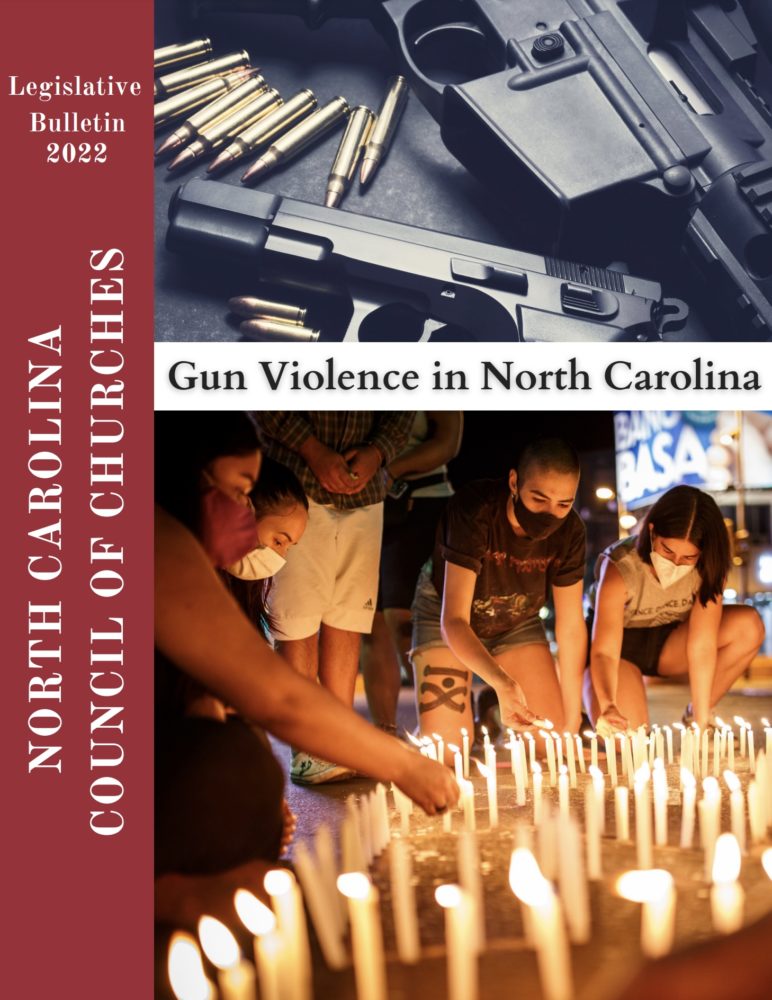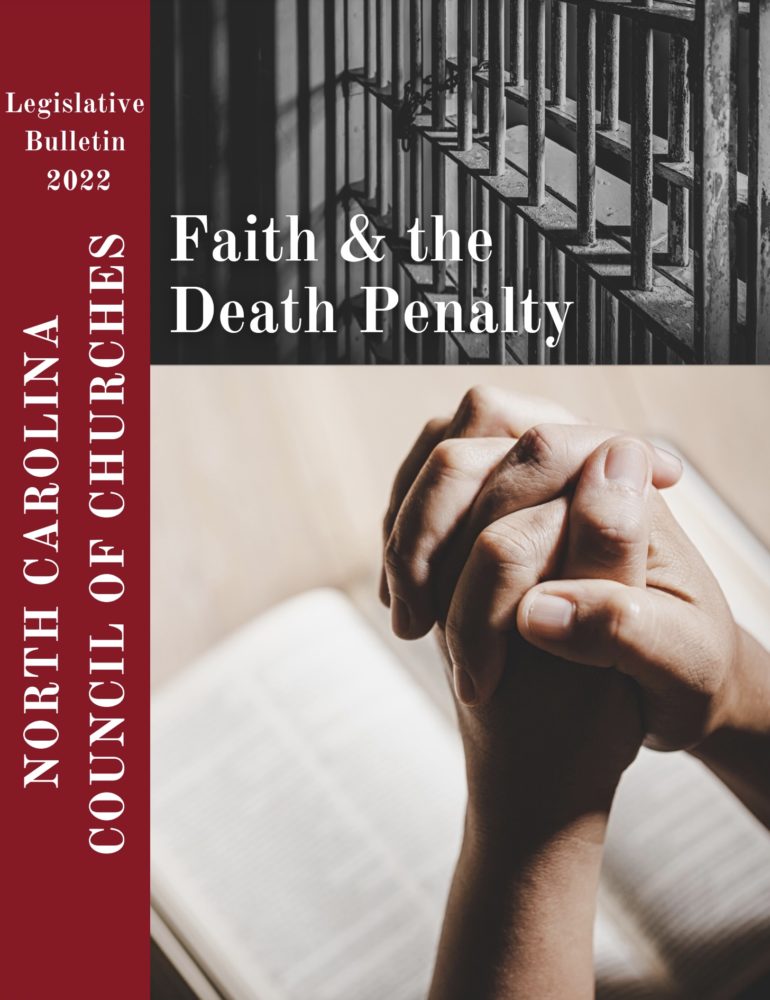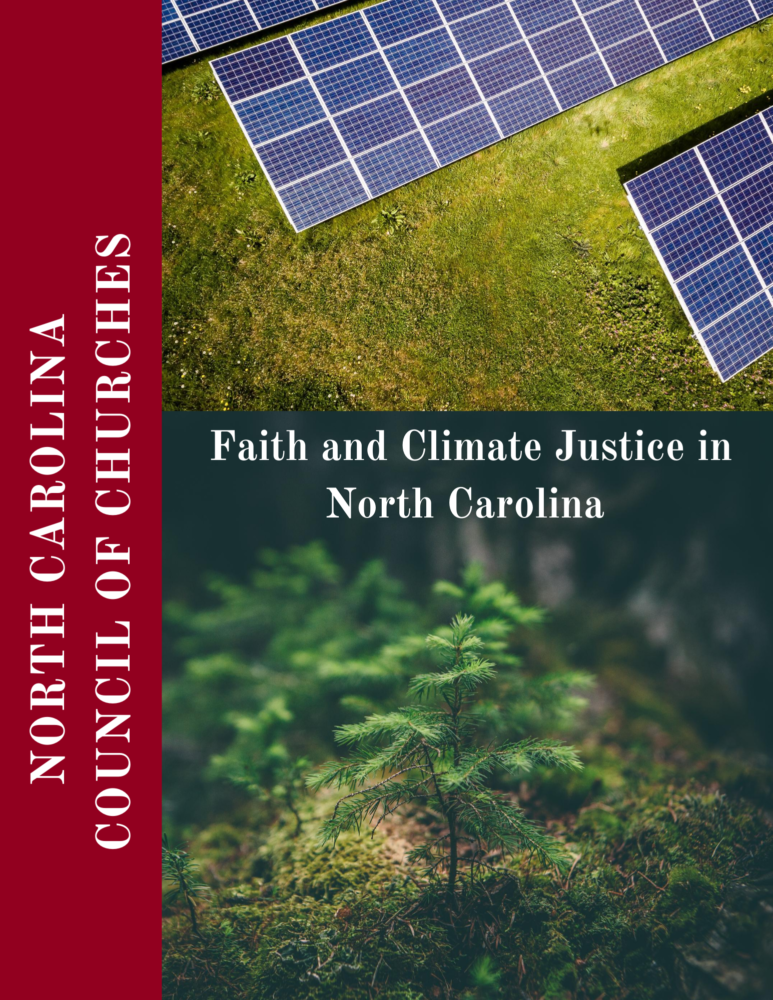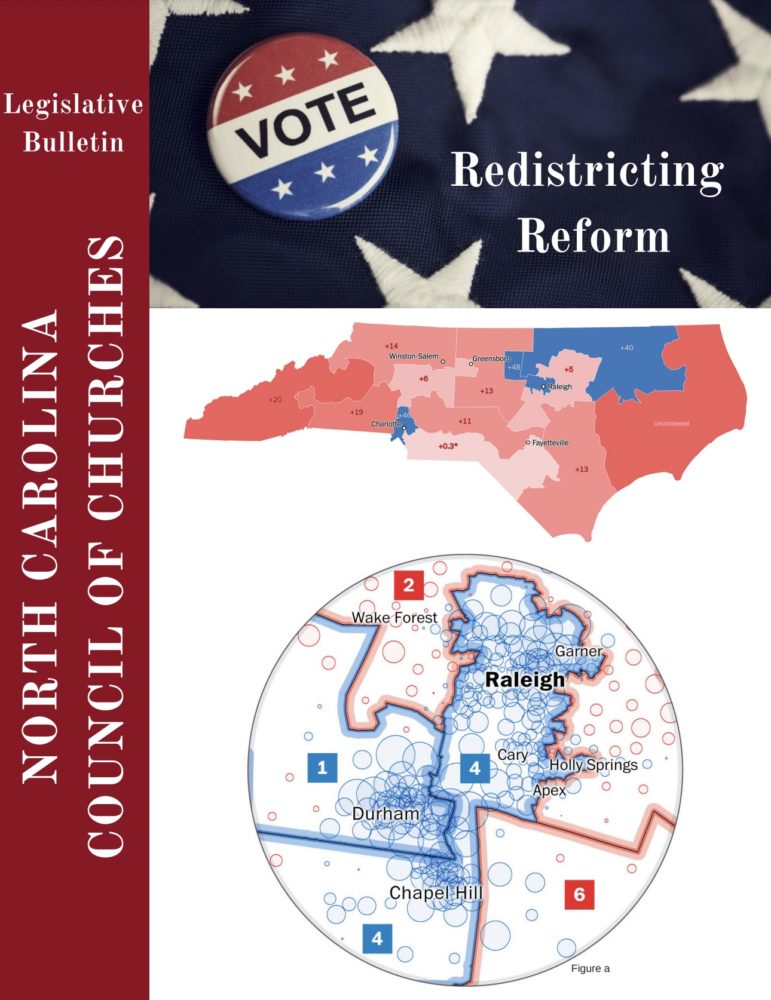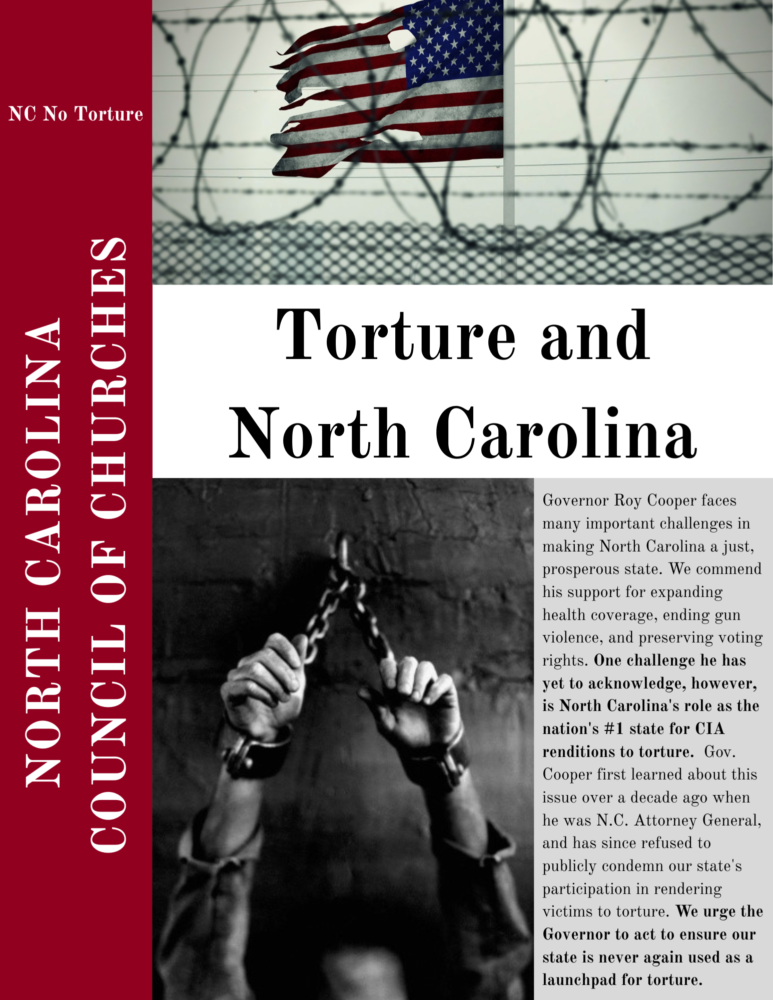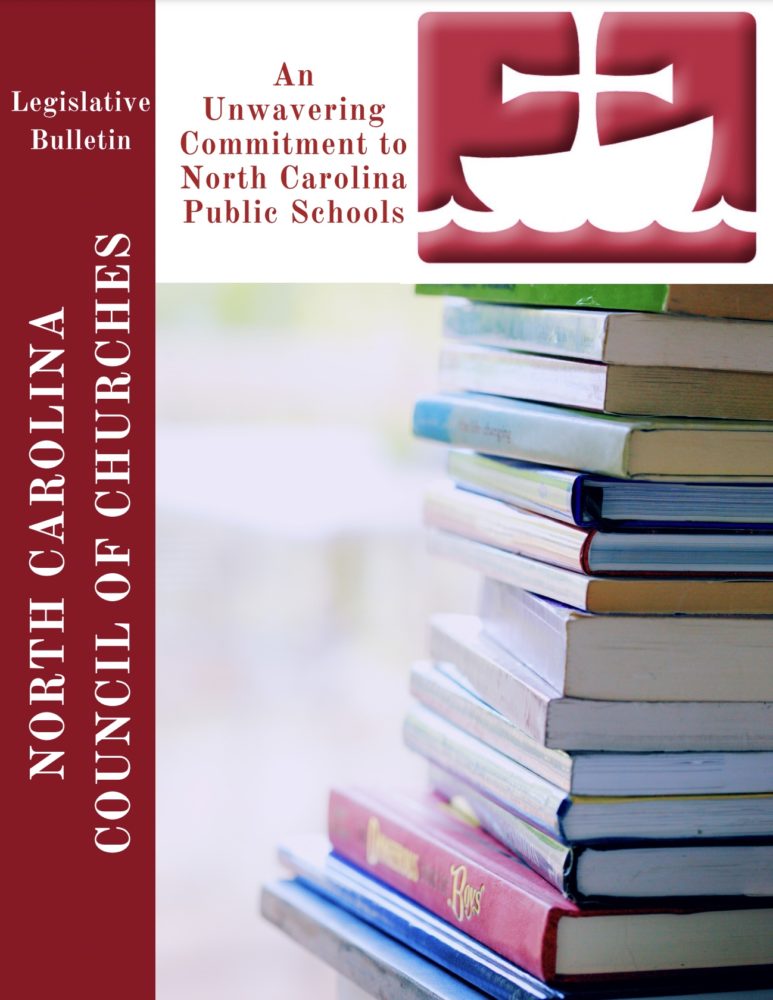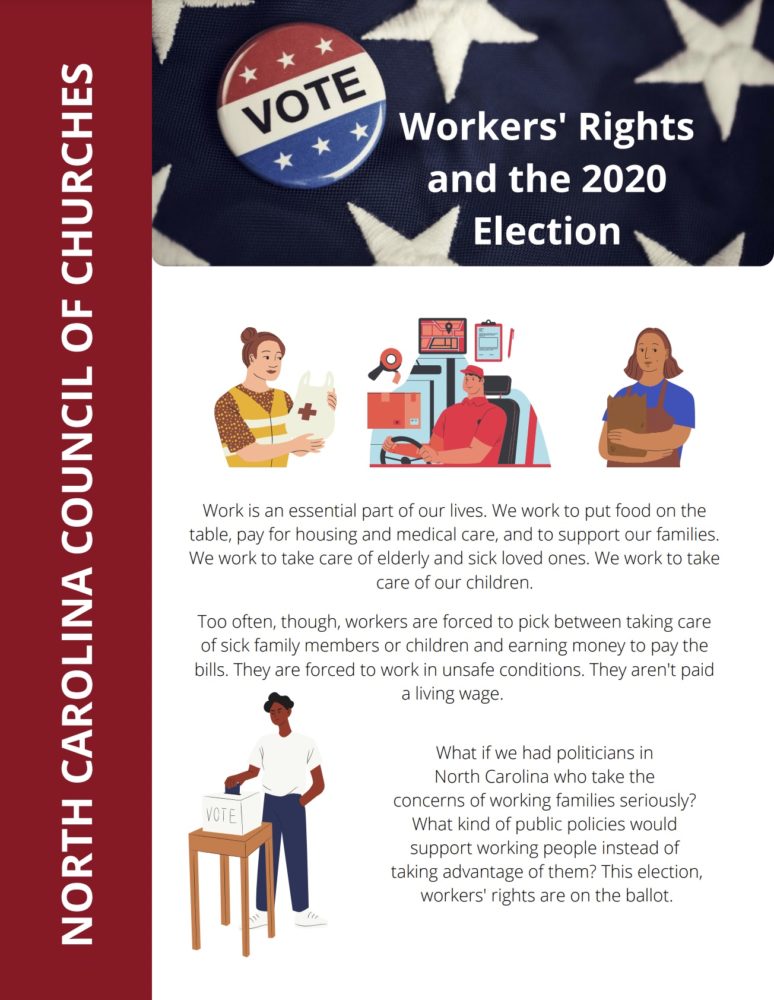Legislative advocacy is an important part of the Council’s work because we recognize that much of our state’s legislation has been rooted in a legacy of racism. By centering the voices of marginalized communities, we continue to advocate for just and compassionate policies in North Carolina that enable all people to flourish regardless of their race or ethnicity. Through the Raleigh Report and our Legislative Seminar we strive to keep the public informed about the intersection of public policy with our faith claims. Additionally, we draft letters to elected official, craft policy statements outlining the Council’s position, and work to equip people of faith across the state to be advocates in their own communities.
Some of our current priority areas include:
- Supporting good government
- Supporting equitable public education policies
- Supporting a compassionate response to the opioid crisis
- Reducing gun violence
- Removing confederate monuments in our state
- Supporting racial justice
- Promoting progressive tax policies
- Advocating for workers’ rights
- Supporting immigrants and farmworkers
- Supporting peace and justice
Overview
The North Carolina Council of Churches has a proven record of moving ahead of the curve on the social issues of its day even when our position was not popular among the churches or the culture. Shortly after we were founded in 1935, the Council was likely one of the first places in the south where black and white leaders sat together to discuss matters of mutual importance.
Since those early days, we have been out in front on race relations (1930s), prison reform (1940s), farmworker rights (1940s), advocating for farmworker labor conditions (1950s), environment (1960s), the Equal Rights Amendment (1960s), prison conditions (1970s), tobacco cessation (1980s), LGBTQ+ concerns (1990s), health and wholeness (early 2000s). We continue to work on many of the issues listed above as well as gun violence prevention, climate justice, cash bail reform, confederate monument removal, raising wages campaign, HIV advocacy, overdose response, voting rights, and more.
Council Resources
Grassroots Advocacy Toolkit
Because the NC Council of Churches is made up of Christian denominations, this toolkit has been prepared specifically with Christians in mind. However, most of its content would be equally useful for people of other faiths. This toolkit will help you understand a little more about what advocacy is, how the legislative process works, and how to affect change.
Legislative Bulletins
Raleigh Report
- Gerrymandering, voter suppression at center stage (10/16/2025)
- Decade of Dangerous Vouchers (7/15/2025)
- Risky turn for N.C. elections (5/30/2025)
- High Court Race, High Stakes (4/11/2025)
- Tuition giveaway’s real costs (9/12/2024)
- Masks, money mean a mess (6/13/2024)
- Extra money, N.C.’s critical needs (4/26/2024)
- Schools face ‘sound basic’ showdown (2/1/2024)
- They ‘stand’ against a gerrymander (11/30/2023)
- Gerrymander games get going (10/26/2023)
Denominational Members’ Resources
Episcopal Church
Mennonite Church
Presbyterian USA
How to Be an Effective Advocate
United Church of Christ
United Methodist Church
Issue Statements
- Resolution on Reproductive Health (September 13, 2022)
- A Resolution to Change the Cash Bail Bond System (August 8, 2022)
- Statement Condemning Violence Against our Jewish Neighbors (January 24, 2022)
- Statement on George Floyd Murder Trial Verdict (April 21, 2021)
- Remove Confederate Symbols Where Justice Is Sought (January 26, 2021)
- Statement on Systemic Racism (June 2, 2020)
- Reaffirmation of Support for the LGBTQ+ Community (June 10, 2019)
- Statement of Opposition to Constitutional Amendments (September 18, 2018)
- Statement Affirming the Ministry of Sanctuary by Congregations (March 8, 2018)
- Policy Statement on the Public Schools (December 15, 2017)
- Confederate-themed monuments: Time to reassess (September 21, 2017)
- Statement Supporting Transparency and Accountability on American Involvement in Torture (September 13, 2017)
- Statement Opposing Fracked Gas Pipelines (September 12, 2017)
- Statement Opposing Offshore Drilling (March 1, 2016)
- Guaranteeing Suffrage, the Right to Vote (December 13, 2013)
- NCCC Board Statement on Syria (September 10, 2013)
- Affirming Principles of Concern for the Poor and Vulnerable (June 8, 2012)
- On the Importance of the State’s Public Health System (June 7, 2012)
- Statement on Accusations about Candidates’ Faith (March 15, 2012)
- Rural Life Committee Supports Ban on Fracking (August 18, 2011)
- Statement on Annual Utility Rate Hikes without NC Utility Commission Review (March 1, 2011)
- Statement on Physical Activity and Nutrition (December 6, 2010)
- Statement on the New York Muslim Community Center Controversy (September 21, 2010)
- Ownership of Agricultural Seeds (March 20, 2010)
- A Policy Statement on Mountaintop Removal Coal Mining (December 1, 2009)
- Statement on Local Immigration Enforcement (December 2, 2008)
- Statement on the Trafficking of Human Persons (December 2, 2008)
- Global Climate Change As a Religious Issue (December 4, 2007)
- Support for Comprehensive Immigration Reform (December 5, 2006)
- Good Government (December 5, 2006)
- Health and Secondhand Smoke (September 5, 2006)
- A Statement on the Public Schools (September 5, 2006)
- The Iraq War and the Use of Torture by Our Country (December 6, 2005)
- Policy Statement on Domestic Violence (March 1, 2005)
- Resolution in Support of Organized Labor in North Carolina (March 2, 2004)
- Policy Statement on a Constitutional Amendment Regarding Marriage (March 2, 2004)
- Medical Malpractice Insurance Issues (December 2, 2003)
- Increasing the Cigarette Tax (December 2, 2003)
- Civil Liberties and the USA PATRIOT Act (December 2, 2002)
- Underage Drinking (November 12, 2002)
- Our Increasing Latino Population (November 12, 2002)
- Remembering the Common Good in Times of Financial Crisis (November 12, 2002)
- September 11 – Six Months Later (March 5, 2002)
- Hog Lagoons (November 9, 2000)
- A Living Wage (November 9, 2000)
- Tax Justice (November 9, 2000)
- Mental Health, Developmental Disabilities, and Substance Abuse Services (November 9, 2000)
- Clergy, Laity and Child Abuse (December 2, 1998)
- Resolution to Support Legislation to Close the School of the Americas (December 2, 1998)
- Electric Utility Restructuring (October 28, 1998)
- Older Adults in Long-Term Care (October 28, 1998)
- Children and Gun Violence (October 28, 1998)
- With All Due Respect (October 28, 1998)
- Religious Liberty (October 28, 1998)
- On Special Provisions in the State Budget (October 28, 1998)
- The Role of Religion in Public Education (May 7, 1998)
- Youth Access to Tobacco Products (January 11, 1997)
- A Policy Statement on Health Care (January 11, 1997)
- Welfare Reform (January 11, 1997)
- The Church and Public Policy for Children (October 29, 1996)
- A Statement on Christians, Churches and Politics (April 18, 1996)
- Violence, Harassment, and Discrimination against Gay Men and Lesbians (April 30, 1992)
- Support for Farmers by Buying Locally and Encouraging Sustainable Farming (October 16, 1990)
- The Church and the Rural Crisis in North Carolina (May 5, 1988)
- Resolution on the Death Penalty (April 23, 1987)
Our Partners
Below is a list of our partners statewide with a link to their website for more information:
- Action NC
- AFL-CIO
- American Civil Liberties Union of North Carolina
- Beloved Community Center of Greensboro
- Carolina Jews for Justice
- Democracy North Carolina
- Equality NC
- League of Women Voters North Carolina
- Mom’s Demand Action
- MomsRising
- North Carolina Black Alliance
- North Carolinians Against Gun Violence
- North Carolinian Voters for Clean Elections
- The NC Justice Center
- Southern Coalition for Social Justice
Ways to Take Action
Attend a committee meeting
Once a bill is introduced in either the House or Senate, it is assigned to a committee for discussion, debate, study, and recommendation.
Committees typically hold meetings that are open to the public. These meetings are generally conducted to obtain and analyze information and opinions about proposed legislation. Often these committee meetings give members of the public a chance to comment on the legislation being considered. Occasionally a committee will schedule a special public hearing on a bill.
We urge people of faith to attend committee meetings and public hearings as a way of increasing their understanding of pending bills and the legislative process. Speaking out at meetings and hearings is another way of making your voice heard and demonstrating the strength of your opinion on a bill.
Call your Legislator
Sometimes calling your legislator is the fastest and easiest way to communicate your position on an issue. Sometimes when legislation is moving very fast through the House or Senate, calling is the only way to go!
Write your Legislator
Email is an effective way to communicate with your legislator especially when it’s specific and not part of a blanket mailing to all members.
Visit your Legislator
Schedule a meeting in advance. During sessions, legislators are available in their Raleigh offices from Monday evenings through Thursday mornings. At other times, they are often willing to meet with you back in the district.
Write an Op-Ed/Letter to the Editor
Op-Ed articles and letters to the editor appear in a newspaper’s Editorial Section. Letters are usually about 200 words or less; Op-Eds no more than 750 words.
Legislative Committee
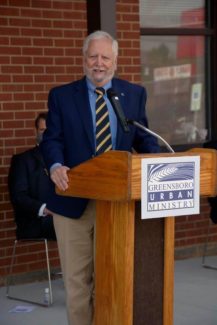
Reverend Frank M Dew
Committee Chair
Frank Dew was born in Raleigh, North Carolina and grew up in Lumberton, North Carolina. He studied at Wake Forest University with a Bachelors in Politics and went on to receive his Masters of Divinity at Wake Forest University. Frank served as pastor in the Presbyterian Church USA for 42 years and is presently retired. He currently serves as Peace And Justice Advocate for Salem Presbytery, and is a volunteer with North Carolina Council of Churches, Bread for the World and PCUSA Hunger Program.
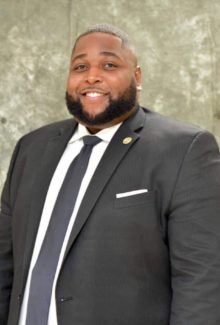
Reverend Marcus L. Fairley
Marcus is a native of Albemarle, North Carolina. Marcus attended Hood Theological Seminary where he found his passion for Social Justice Gospel and hope for the plethora of disparities faced by people of color through Black Liberation Theology. Marcus recently joined Advance Carolina as Constituent Services Program Associate. Rev. Fairley has experience on a national and state level from NAACP in the capacity of Civic Engagement & Faith. He is a General Board Member of GBSCNC, a member of Lott Carey Foreign Missions Thriving Pastors under 40, and serves as the Second Vice Moderator of Rowan Baptist Association. Rev. Fairley is the proud pastor of the historic St. Luke Missionary Baptist Church. When he is not spreading the gospel or spearheading initiatives to liberate people of color, he enjoys traveling with his lovely bride, listening to music, and locating the nearest beach to relax.

Reverend Alan Felton
Reverend Alan Felton is a life-long Methodist and North Carolinian. Alan grew up in Edgecombe and Wilson Counties. He and his wife, Joan, are parents of two children, John Alan and Virginia Gayle, as well as two beloved dogs, Lucy and Freedom.
Alan earned a B.A. in History (concentrations in American and African history) along with a minor in political science from North Carolina Wesleyan College. He received his M. Div from Duke University’s Divinity School along with a specialization certificate in gender studies there. Alan served in the U.S. Army infantry and almost fifteen years in politics and government before entering the ministry, including nine years at the North Carolina Department of Revenue where he held various positions including planning director, assistant secretary for tax compliance, assistant secretary for business systems, and chief of change management and organizational development.
He is the vice-president of the Methodist Federation for Social Action’s NC chapter and a member of Duke Divinity School’s national alumni board. He is also a member of the advisory board for the Center for Reconciliation at Duke Divinity School. He is a member of the NC Conference’s Connectional Table, a body charged with helping to cast and implement the Conference’s vision for healthy congregations and effective leaders in every place making disciples of Jesus Christ for the transformation of the world and he serves as chair of the Table’s Diversity and Racial Equity Team. He also serves on the Capital District’s Racial Healing Team and the District’s Buildings and Relocation Committee. He sits on the board of directors for the NC Institute for Spiritual Direction and Formation. He is currently pursuing his doctor of ministry degree in the area of preaching and homiletics at Hood Theological Seminary.
He has a passion for the proclamation of the Gospel, making disciples through personal and organizational development, and working for justice in the world, particularly at the intersections of race and gender. Before arriving at North Raleigh, he served as pastor in churches in Oxford, Henderson, Apex, and Durham, North Carolina.
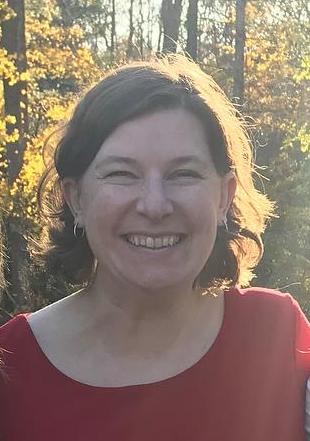
Reverend Jill V. Isola
Reverend Jill Isola is currently a pastor at Northminster Presbyterian Church (USA) in Hickory, NC. Jill brings a passion for justice to her work with the legislative committee of the NCCC. She holds a Master of Divinity from Union Presbyterian Seminary in Richmond, VA, and experience serving churches in northern NJ, Michigan, Virginia, South Carolina as well as experience in community organizing work in Richmond, VA. Rev. Isola serves in the Presbytery of Western NC helping to coordinate the work of the Peace and Justice committee around justice issues that include food insecurity, affordable housing, affordable and accessible physical and mental healthcare, faith-based harm reduction, racial equity and diversity and creation care.


